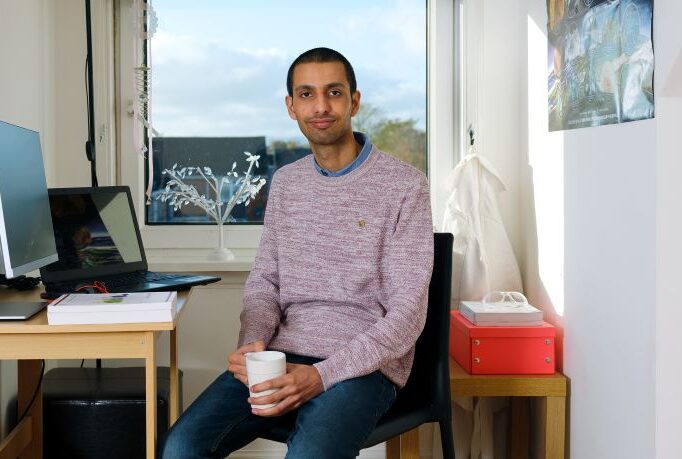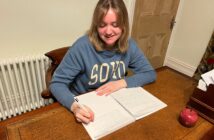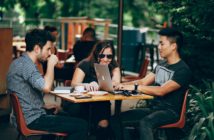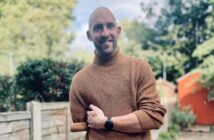Geochemist Ali always knew he wanted to study science, but it wasn’t by design that he studied with The Open University in Scotland. When Ali realised he could apply his learning direct to his job – and right away – the OU turned out to be the best possible choice for his career.
“I’ve always wanted to go to university,” says Ali. “When I moved back to Scotland from Pakistan, I did Scottish Highers and I got very good grades. I applied for university and then got all the offers but I couldn’t afford to pay the tuition fees without any support.”
Disappointed that things hadn’t worked out as he’d planned, there was no giving up on his dream. By taking an apprenticeship at a local university and signing up for an HNC in biological sciences at his local college, Ali felt that he was at least going in the right direction.
On finishing his apprenticeship, Ali was offered a full-time technical post. “I had some financial responsibilities as well,” Ali explains. “I couldn’t just leave everything and go to university from scratch and become a student at that point.”
But as determined as ever to get a degree, Ali assessed his options.
Family endorsement
“My dad had already ‘done’ Open University back in his time, so he’s quite fond of the OU already,” says Ali.
“I wasn’t sure at the very beginning if I could do everything remotely as I’d never seen anyone do such a thing. I’ve always seen people study the traditional way and go to a physical university.
“So the idea of the OU was a bit daunting,” he continues. “But because my dad was speaking so favourably about it, especially the course content, I thought I would give it a try and see how that goes.”
Ali knew that having his family onboard from the outset would be a huge advantage:
“The Open University is a family effort. It’s not a one person thing, you need support from other people and I was lucky that I had that support from my family.”
Overcoming reservations
When Ali started to find out more about the OU, things began falling into place. He could transfer the credits from his college course, which meant he didn’t have to start all over again. Government funding was available to cover his OU tuition fees. And he liked the flexibility of the BSc Honours Open Degree, where he could choose the modules that were most relevant for his career.
“Picking the OU was a no brainer for me,” Ali says. “I loved the course content and the books that came through my letterbox, and that they were available virtually too.
“I could study on my phone or with my books, there’s multiple ways of sitting the same content and I didn’t have to attend lectures in the morning. The OU fitted in very nicely with my routine and with my work.”
Impressing his employers
“I basically studied in evenings and during weekends and at work, during lunchtime and other times when it wasn’t busy. My employer was quite in favour of me doing that. So that was a good thing, that they valued it and they thought that it would be good for my career progression and for them as well. They saw that I would be able to gain my qualification and increase my knowledge and skills through the degree program.”
After he graduated, Ali’s OU studies made a good impression on his next employer too.
“They were impressed not just with the degree,” says Ali. “But because I had demonstrated that I’m able to work full time and study full time and manage everything that comes along with it.
“One of the real advantages of an Open University degree is that you can apply the learning almost immediately in your job, if you’re working,” says Ali. “You can’t always do that if you’re doing a degree and then coming out, getting a job, and waiting until then to apply your knowledge.”
Supported distance learning works
While the remote aspect of OU study was one of the things Ali was most sceptical about at first, he was soon reassured.
“The tutors were fantastic,” he says. “They were there to support you whenever you needed. In some courses there was more contact with fellow students than others, especially when you had group exercises in later modules.
“It was a challenge obviously because everyone was working in their own time and not everyone was going to be available when you needed something. But I think it was a good challenge to experience and overcome. It prepares you for real life.”
Ali’s now putting this experience into practise as he works in a laboratory on research projects with scientists all over the world.
“We collaborate with people in the USA and Japan, and everyone is working in a different time zone altogether,” he says. “Some are eight hours ahead and some are seven hours behind us, so not everyone is going to be there at the time that you’re going to be working on that project.
“Through doing the OU’s online group experiments you do develop that communication skill set that is useful for you in real life.”
‘Remember your goal’
Ali’s OU journey has helped him to get where he is today – but he admits, it wasn’t always easy. He has the following advice for anyone needing a little extra motivation:
“You have to remember your end goal. Have that in the back of your mind all the time, because you will be tested throughout your degree – your skills, knowledge and resilience will all be tested. Remember, it’s achievable. You can do it.”
Introducing a new photo series of OU students
Ali is one of four students featured in a brand-new partnership between The Open University and Alamy, which aims to increase authentic representation of Black and Asian distance learning students. Find out more about this campaign here .



